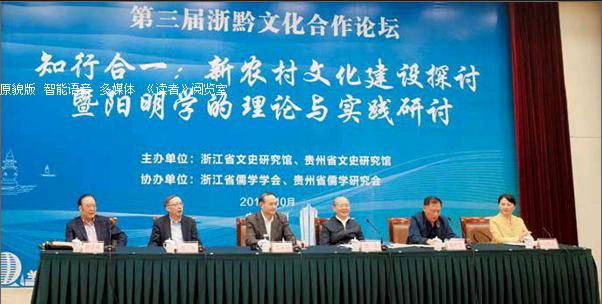时空对望三千里
2017-01-10朱凤娟
朱凤娟

浙黔两地的文化拥抱
黔、浙两地,从古至今,往来不断,其历史文化渊源如长江之水,浩荡绵延。著名哲学家王阳明出生于浙江、悟道于贵州,成为联系两地文化、学术的重要纽带。上世纪40年代,抗日战争期间的浙大西迁,又一次带来两地的文化拥抱。
一个是原生态文化镜像灿烂多彩,一个是人文气象繁盛历史积淀深厚。两个特色鲜明的地域文化的每一次相遇携手,都开出异常鲜艳的文化之花。尤其是近年来,浙江省和贵州省打破空间距离,在经济、教育、卫生、科技、旅游等方面展开了充分合作,双方正携手并肩织出一方璀璨锦绣。
两地的交往脉络,在浙江省文史研究馆馆员、浙江省儒学会执行会长吴光看来,其实就是一种财富。2006年秋,他随团赴黔采风,与贵州省文史研究馆同仁进行深度交流,两地合作的种子悄然萌芽。
2013年5月,吴光应邀到贵州讲学,了解到贵州省和贵阳市对王阳明和阳明学非常重视,遂在5个月后再次去游学,更真切地感受到贵州省对于弘扬中华优秀传统文化特别是阳明学的重视与热诚。当了解到王阳明学说中的“知行合一”和“亲民”思想在贵阳深入人心,并已成为贵阳的城市精神,他深为感慨。在与贵州同仁的座谈中,他提出两馆合作创办两省文化论坛的设想。吴光的想法是:“论坛将以‘知行合一、精诚合作、弘道兴文、开创新局为指导思想,依托地方历史文化资源,通过黔、浙两地历史文化的学术交流合作,助推两省文化建设,促进中华优秀传统文化的传承与传播。”
贵州省文史研究馆馆长顾久说,从历史来看,黔、浙两省有着很深的历史和文化渊源。特别是王明阳和阳明学,是两省共同的文化资源和永恒话题。文史馆为传承民族记忆,深感责任重大。
为建立两省长期的文化交流合作机制,“浙黔文化合作论坛”应运而生。由浙江、贵州两省文史馆共同主办、两省儒学研究机构协办,社会各界参与的省际文化合作交流平台,在“时空对望三千里”的浙江和贵州,轮流举行。
此前,“浙黔文化合作论坛”已在贵州贵阳举办两届。第一届主题是“文化中国:时代的使命与学者的承担”,第二届主题是“阳明学的当代价值与传承创新”。
研讨新的传承和弘扬
2016年10月27日,第三届“浙黔文化合作论坛”在杭州开幕。本届论坛围绕“新农村文化建设探讨”和“阳明学的理论与实践研讨”两个主题展开交流研讨,邀请了国内农村文化建设领域和阳明学研究领域的20余位专家、学者参加,旨在为探索城乡一体化进程中新农村文化发展趋势和弘扬“知行合一”人文精神提供有价值的思考和建议。
在“新农村文化建设探讨”上,与会专家学者运用“知行合一”理论,传承“知行合一”思想,强调“经世致用”,从多方面多角度分析、讨论了当前农村文化发展的现状、问题和趋势,探索新农村文化建设的路径。
浙江省文史馆馆员邵鸿烈对以前的贵州之行依旧印象深刻,他认为,在新农村建设方面浙江和贵州正好是“发展的两极”,如何推动新农村建设,把“美丽资源”转换为“美丽经济”,贵州可以从浙江得到启示;而如何在社会流动变化中守护传统乡土文化,浙江需要向贵州寻找经验。浙江省委党校副教授董敬畏则认为,从浙江和贵州两省的交流中,我们需要更多关注城镇化背景下乡村文化的凋敝、乡民生活的困顿、乡民对于乡村及生活意义的认同,关注乡民的生活自觉而非单纯的经济理性。
在“阳明学的理论与实践”研讨中,与会专家一致认为,传承与弘扬阳明学,必须与新的社会历史发展条件相结合。当前,以社会主义核心价值观为引领,传承与弘扬中华民族优秀传统文化,实现中华民族伟大复兴,必须坚定文化自信。王阳明及其创立的心学在中国思想史上占有重要地位,是中华民族优秀的精神财富,值得不断发掘,特别是其“知行观”所蕴含的道德追求和实践品格,激励我们结合新的时代条件去传承和弘扬优秀的传统文化及价值理念。
一种观点或思想,其根本、永恒的价值,在于走进百姓生活并存留其间,进而影响大众、服务社会。传播国学精粹,编织观点碰撞、和声四起的文化新景观,与正在开展的两省经济社会、生态文化活动形成呼应之态,“时空对望三千里”的文化镜像,折射出东、西部对文化的共同渴望和对开放合作的同样期许。
(本文照片由作者提供)
Zhejiang in the east and Guizhou in the southwest have been engaged in cultural exchanges since ancient times even though the two provinces are 1,500 kilometers away from each other. Wang Yangming, a native of Zhejiang, figured out his philosophy at Guizhou and from there he found his way into the history of Chinese philosophy. He is a strong academic and cultural tie between the two provinces. In the 1940s, Guizhou served as the wartime haven for the Zhejiang University in exile. The two provinces embraced each other and enriched each other through this contact.
In recent years, the two provinces have intensified efforts to strengthen cooperation in economy, education, public health, science, technology, and tourism.
Wu Guang, a researcher with Zhejiang Research Institute of Culture and History and executive director of Zhejiang Confucianism Association, has been personally engaged in cultural exchanges and cooperation with Guizhou for a long time. In his eye, the ties between the two provinces constitute a cultural wealth. In the autumn of 2006, he visited Guizhou and conducted in-depth academic exchanges with his colleagues at Guizhou Research Institute of History and Culture.
In May 2013, he was invited to give lectures in Guizhou. During that stay, he became aware that Guizhou Province and Guiyang City gave top priorities to Wang Yangming and the studies of his philosophy. Five months later, he arrived in Guizhou again to give more lectures. In a workshop with his colleagues in Guizhou, he proposed that the two institutes work together and found a joint cultural forum.
His colleagues in Guizhou agreed with Wu on the importance of Wang Yangming and of the studies of Wangs philosophy. The forum came into being to promote academic and cultural ties between the two provinces. The forum has been held in Guizhou twice. The theme featured at the first forum was “Chinas Culture: Scholars Mission and Responsibility”. The second forum explored as its theme “the Contemporary Value of Wang Yangmings Philosophy and Innovation in Carrying it Forward”.
October 27, 2016 witness the curtains raising on the Third Zhejiang-Guizhou Cultural Forum in Hangzhou. Experts from the two provinces focused on two subjects. One was about rural cultural reconstruction and the other was about the theory and practice of Wang Yangmings philosophy. Over more than 20 experts from across the country were also invited to attend the forum too.
Shao Honglie, a member of Zhejiang Research Institute of History and Culture, was deeply impressed by his previous visits to Guizhou. In his opinion, Zhejiang and Guizhou saw different growth situations in rural reconstruction. Guizhou could learn something from Zhejiang in making best economic use of the resources of natural beauty whereas Zhejiang could tap into the experience of its counterpart in protecting the native and rural culture.
Dong Jingwei, an associate professor with Zhejiang Party School, believed that the focus of the cultural cooperation and exchanges between the two provinces should be on urgent rural issues such as the decline of rural culture in the trend of urbanization, rural residents identification with rural home and life, and the economic rationality and life consciousness of rural residents.
In discussion of the theory and practice of Wang Yangmings philosophy, participants agreed that studies and social undertakings that put study results to action must be considered and handled in the perspective on social and historical realities.
